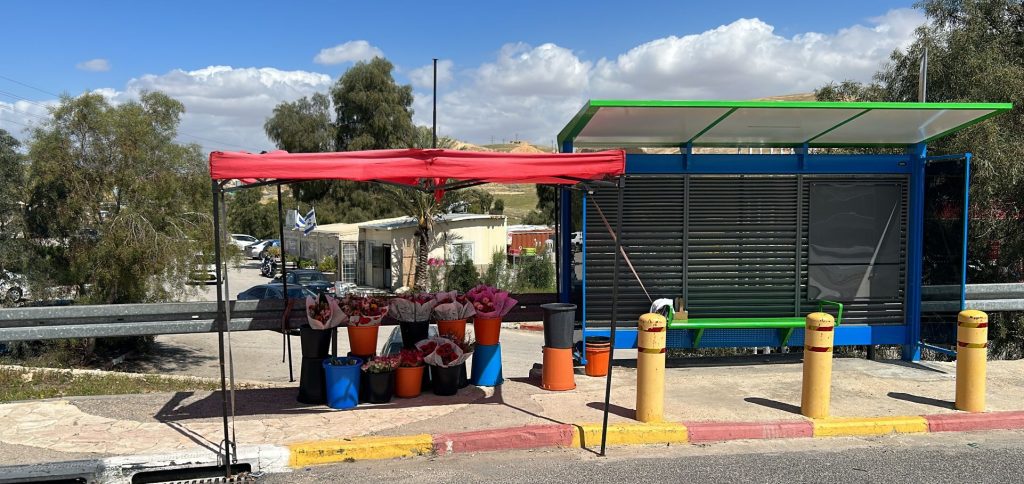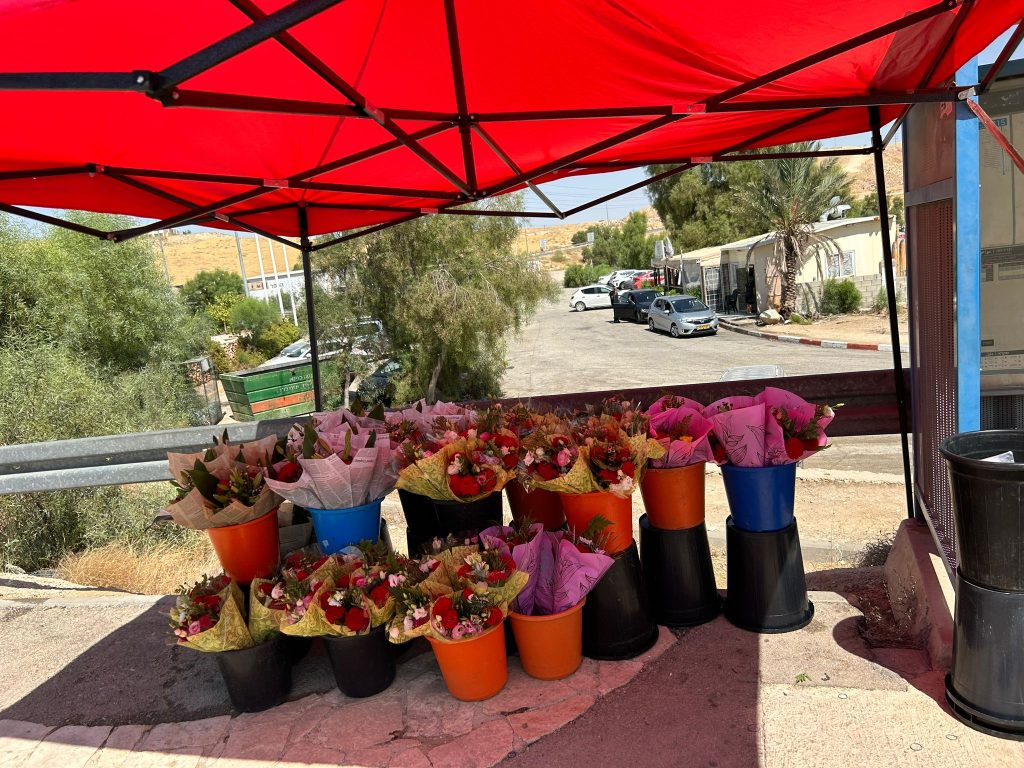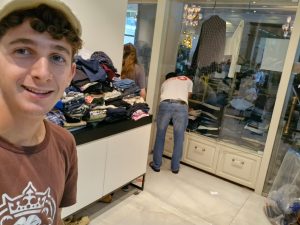Every Friday for the past three years, Boaz would wake up at 5:00 am to the tune of ‘Avoda Kasha’ – Hard Work on his smartphone. He’d throw on a pair of jeans and a t-shirt, then rush to wake up his father. This routine never changed. His father would drive him down to the bus stop by the main road, near the gas station leading to their community and several neighboring ones. Boaz would then get out, retrieve the supplies he had packed the night before from the trunk, offer a quick thanks to his dad before shutting the back door, and watch as his father drove away.
First, Boaz would set up a portable gazebo to protect himself from the sun or rain. Then he’d line up his buckets, fill them with water, and finally, unfold his folding beach chair to sit and wait for the truck to arrive.

Without fail, the same truck and driver would arrive every week, supplying him with bundles of colorful flower bouquets that changed with the season. Roses, peonies, sunflowers, gladiolus, lilies, and colorful mixes would fill his buckets.

Boaz would arrange the flowers and wait for his clients – those who stopped to purchase flowers for Shabbat. Although his job felt like a reverse painting, starting out colorful and fragrant and then fading as the day went by, he loved it. This had been his routine since he took over the business from his older brother, and now, as a senior in high school, he knew it was almost time to pass it on to someone else.
Every car that pulled up to the curb excited him, whether it was a regular, occasional, or random passing-by client.
“Shalom! Flowers for Shabbat?” Boaz would ask joyfully. “What do you like? Perhaps roses or sunflowers – they’re stunning this week.” And he’d send them off with a smile, saying, “The flowers you choose are beautiful. Shabbat Shalom to you and your family.”
Eli was one of the first to arrive every Friday, on his way home from his ritual early morning shopping, stroll, and coffee at the Machane Yehuda Market in Jerusalem. He’d roll down the window, hand Boaz a hot coffee he just picked up, along with a 20 Shekel bill. “Shalom Eli, Toda Rabbah for the coffee. How was the Shuk?” Boaz would ask as he handed him his usual bouquets of mixed seasonal flowers. “Wonderful, Toda for asking,” Eli would reply, “have a nice day and Shabbat shalom to you and your family.”
Moshe, another regular, eased up to the curb. He always stepped out with a majestic presence, his face radiating with a long, white beard and deep creases beneath his eyes, bearing witness to a life rich with experiences and seriousness. Returning from early morning prayers and study with his havruta– study partner, his tefillin and books piled on the front passenger seat, clearly marked his devotion. ‘Tzafra Tava,’ he greeted in Aramaic as he walked over and chose two bouquets of flowers. ‘I am here for Zachor (Remember) and Shamor (Observe) Lichvod Shabbat – in honor of Shabbat’.
Dor was young and newly married. It seemed he had recently moved into the area because for the past couple of weeks Boaz had noticed him driving in and out of the community, running errands. Each time Dor stopped on the side to pick up flowers for his bride, there were none left. Determined to change that, the next time Dor passed by, Boaz flagged him down and asked him to pull over. “Shalom, how about you take a bouquet of flowers now while I still have them,” he suggested. Dor’s eyes lit up. “Toda, I will. We just got married, and these Friday rushes are more than I expected.” As Dor drove away, Boaz added, “The flowers you chose are beautiful. Shabbat Shalom to you and your bride,” which brought a smile to Dor’s face and ease to his hectic morning.
Another regular was a young handsome man, always well dressed in a clean and washed car. Boaz couldn’t figure out if he liked the area or the women. He was not from the around; but it seemed all the women he dated were. Every week he would pick up flowers ‘for my girlfriend’ – he would say. But every couple months the girlfriend was someone else. Whenever he came around it brought a smile to his face. It reminded him of young love, like the young guys, teenagers, that would get out and leave their girlfriends in the car. After looking at all the flowers, they would buy the cheapest bounce, walk back to the car and declare out loud ‘look what I got you my love- the best, and most expensive’. Boaz knew that when he would find love he would make sure to give her the most beautiful and fragrant flowers he could find, not only on friday, but every day.
Men and women would pull up to the side of the curb, and Boaz knew exactly in each household who did what. He felt it was easier with the woman, for the men were always trying to figure out what their wives would like, but the woman knew from their first glimpse what they wanted. On the one hand this made the sales easy, but on the other hand, it opened up those couple moments of transaction to a time of all kinds of sharings. He got used to listening and keeping what he heard to himself. One client had a routine remark. “You know Boaz, if my husband doesn’t get me flowers, I will get them for myself! I don’t need him to get them for me. I will love myself!’. Gracely he would simply add ‘you choose great flowers, Shabbat Shalom to you and your family’, and sometimes throw in ‘how about a tip for the shrink?’
There were those who pulled up, took a look from the car, and pulled away. Some always asked for a discount or a deal. Then, there was this one guy who only took white flowers. If there were none, he would shake his head with dissatisfaction, as if it were Boaz’s fault that they were not in season or that he didn’t arrive early enough before they were sold out. Yes, the complainers were a breed of their own, never satisfied and always had something to say. “That’s all, no bigger selection?” “Expensive this week – how about a discount?” “Last week’s flowers withered and didn’t last like I wanted them to!” “It’s still early and that’s all that’s left?” “Why are you on the side of the road? The exhaust smoke is ruining the flowers.” And Boaz, no matter what was said, would smile, put the money in his pocket, and send them off with a “Shabbat Shalom”.
It was a community business, and he was well-known within the community. He couldn’t step outside without being noticed. “How’s my flower boy?” the old ladies would murmur as they walked past him. Cars would slow down, windows would open, and people would shout at him from the other lane, “I owe you for flowers, I didn’t forget, this week God willing.” Once, a group of joggers passed him on their way to school. A lady turned around and came back, seemingly to confront him. “I am pregnant, and it’s because of the beautiful flowers you gave my husband. I think I will call the baby Perach – flower, or Lilach – Lilac, or Vered – Rose, or something like that,” she said before turning around to catch up with her friends. It happened often, at the grocery store, library, school, park, and just about everywhere. He couldn’t escape it.
This was how he spent his Friday mornings, becoming familiar with everyone and everything occurring in the community. He was aware of celebrations like birthdays, wedding anniversaries, births, bar and bat mitzvahs, engagements, and weddings. He also knew about unfortunate events such as the loss of loved ones or memorials for those who had passed away. Additionally, he kept track of who was dating whom, valuable gossip in a community.
During holidays like Rosh Hashanah, Sukkot, and Pesach, he doubled his efforts. For Shavuot, he supplied flowers for the various synagogues in the community, as it was customary to decorate synagogues with green plants and flowers.
Boaz cherished his work, and his clients cherished him in return. The most challenging moment of his day occurred during closing time when cars pulled up, inquiring if there were any flowers left. His buckets were empty, except for one last bouquet. With regret, he would reply, “I’m sorry, but unfortunately not. Perhaps next time. I wish you a hearty Shabbat Shalom.”
After his dad parked the car, he entered the house, feeling both exhausted and content. He stowed the day’s earnings in his pocket and contemplated the trip he would take once he had saved enough money. Approaching the Tzedakah Box beside the candles set up for Shabbat, he dropped in 10 shekels. Then, turning to his mom, he handed her the final bouquet, gave her a kiss, wished her Shabbat Shalom, and collapsed onto his bed for a well-deserved pre-Shabbat afternoon nap.
Later that night, at the Shabbat dinner table, Boaz would gaze at the flowers in the vase in the center and feel his heart swell with pride. He knew that many flowers added color, sweet smells, and love throughout his community.



